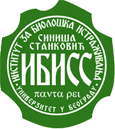Partner: UNDP Serbia
Period of the agreement: December 2022 - December 2023
Project leader: Dr. Dajana Todorović, Department of Insect Physiology and Biochemistry IBISS
Members:
Abstrakt
Given the world population growth, the need arose for alternative sources of protein-rich food to protect the environment and ensure sustainable development. The production of conventional food negatively impacts the environment: large amounts of natural resources are used; many greenhouse gases (GHG) are released during production. A potential solution, contained in our initiative, is the cultivation of Tenebrio molitor (mealworm) larvae on agricultural farms and by food manufacturers. The nutritional composition of this insect's larvae is similar to fishmeal and can be an excellent alternative protein source for animals/aquaculture. Larvae are grown ecologically: in a small area; on wheat bran without additives, antibiotics, pesticides; without large consumption of energy and water, while reducing GHG; in easily controlled conditions... The mealworm's advantage is its ability to break down organic waste and plastic, reducing their amount in local landfills. Larval frass (feces with unused food and exuviae) can be used as a high-quality organic fertilizer. The Initiative aims to develop environmental awareness among farmers and plant/animal food manufacturers and to encourage them to establish T. molitor larvae "farms." It could bring multiple benefits to them individually and the whole community: costs reduction in the procurement of animal feed, consumption of fewer resources and less energy compared to the production of usual protein sources, reduction of GHG and landfill waste, manufacturing of quality organic fertilizer... Across Serbia, the education of farmers is planned through lectures, seminars, workshops... The initial culture of mealworm larvae would be provided by the IBISS and BA incubation center, with which we are already cooperating and working together to implement a project related to insects and the circular economy. By implementing this Initiative on only 1% of agricultural farms in Serbia, reduction of CO2 emissions will be reduced for 348430 tons/20 years.




